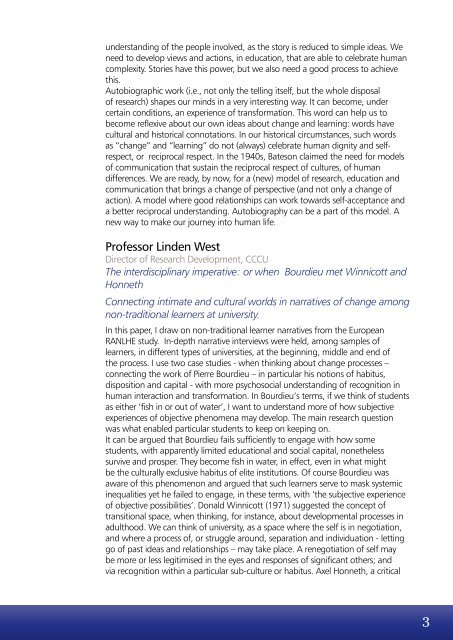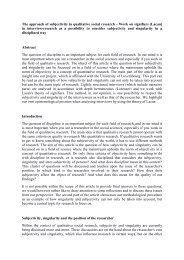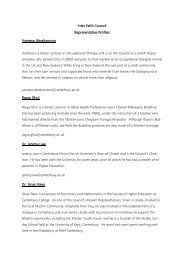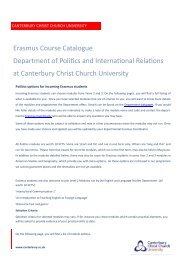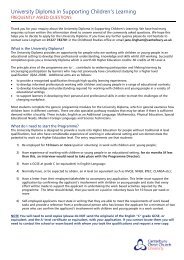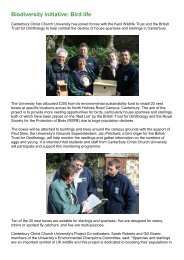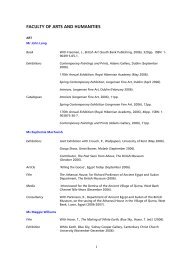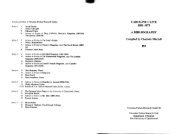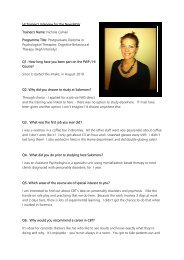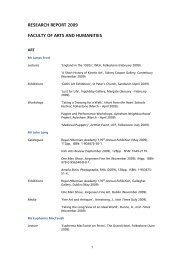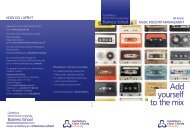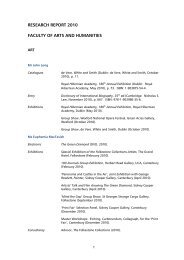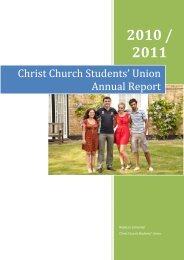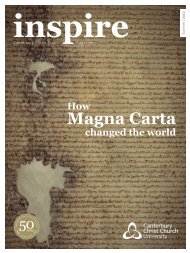Constructing narratives of continuity and change - Canterbury Christ ...
Constructing narratives of continuity and change - Canterbury Christ ...
Constructing narratives of continuity and change - Canterbury Christ ...
Create successful ePaper yourself
Turn your PDF publications into a flip-book with our unique Google optimized e-Paper software.
underst<strong>and</strong>ing <strong>of</strong> the people involved, as the story is reduced to simple ideas. We<br />
need to develop views <strong>and</strong> actions, in education, that are able to celebrate human<br />
complexity. Stories have this power, but we also need a good process to achieve<br />
this.<br />
Autobiographic work (i.e., not only the telling itself, but the whole disposal<br />
<strong>of</strong> research) shapes our minds in a very interesting way. It can become, under<br />
certain conditions, an experience <strong>of</strong> transformation. This word can help us to<br />
become reflexive about our own ideas about <strong>change</strong> <strong>and</strong> learning: words have<br />
cultural <strong>and</strong> historical connotations. In our historical circumstances, such words<br />
as “<strong>change</strong>” <strong>and</strong> “learning” do not (always) celebrate human dignity <strong>and</strong> selfrespect,<br />
or reciprocal respect. In the 1940s, Bateson claimed the need for models<br />
<strong>of</strong> communication that sustain the reciprocal respect <strong>of</strong> cultures, <strong>of</strong> human<br />
differences. We are ready, by now, for a (new) model <strong>of</strong> research, education <strong>and</strong><br />
communication that brings a <strong>change</strong> <strong>of</strong> perspective (<strong>and</strong> not only a <strong>change</strong> <strong>of</strong><br />
action). A model where good relationships can work towards self-acceptance <strong>and</strong><br />
a better reciprocal underst<strong>and</strong>ing. Autobiography can be a part <strong>of</strong> this model. A<br />
new way to make our journey into human life.<br />
Pr<strong>of</strong>essor Linden West<br />
Director <strong>of</strong> Research Development, CCCU<br />
The interdisciplinary imperative: or when Bourdieu met Winnicott <strong>and</strong><br />
Honneth<br />
Connecting intimate <strong>and</strong> cultural worlds in <strong>narratives</strong> <strong>of</strong> <strong>change</strong> among<br />
non-traditional learners at university.<br />
In this paper, I draw on non-traditional learner <strong>narratives</strong> from the European<br />
RANLHE study. In-depth narrative interviews were held, among samples <strong>of</strong><br />
learners, in different types <strong>of</strong> universities, at the beginning, middle <strong>and</strong> end <strong>of</strong><br />
the process. I use two case studies - when thinking about <strong>change</strong> processes –<br />
connecting the work <strong>of</strong> Pierre Bourdieu – in particular his notions <strong>of</strong> habitus,<br />
disposition <strong>and</strong> capital - with more psychosocial underst<strong>and</strong>ing <strong>of</strong> recognition in<br />
human interaction <strong>and</strong> transformation. In Bourdieu’s terms, if we think <strong>of</strong> students<br />
as either ‘fish in or out <strong>of</strong> water’, I want to underst<strong>and</strong> more <strong>of</strong> how subjective<br />
experiences <strong>of</strong> objective phenomena may develop. The main research question<br />
was what enabled particular students to keep on keeping on.<br />
It can be argued that Bourdieu fails sufficiently to engage with how some<br />
students, with apparently limited educational <strong>and</strong> social capital, nonetheless<br />
survive <strong>and</strong> prosper. They become fish in water, in effect, even in what might<br />
be the culturally exclusive habitus <strong>of</strong> elite institutions. Of course Bourdieu was<br />
aware <strong>of</strong> this phenomenon <strong>and</strong> argued that such learners serve to mask systemic<br />
inequalities yet he failed to engage, in these terms, with ‘the subjective experience<br />
<strong>of</strong> objective possibilities’. Donald Winnicott (1971) suggested the concept <strong>of</strong><br />
transitional space, when thinking, for instance, about developmental processes in<br />
adulthood. We can think <strong>of</strong> university, as a space where the self is in negotiation,<br />
<strong>and</strong> where a process <strong>of</strong>, or struggle around, separation <strong>and</strong> individuation - letting<br />
go <strong>of</strong> past ideas <strong>and</strong> relationships – may take place. A renegotiation <strong>of</strong> self may<br />
be more or less legitimised in the eyes <strong>and</strong> responses <strong>of</strong> significant others; <strong>and</strong><br />
via recognition within a particular sub-culture or habitus. Axel Honneth, a critical<br />
3


